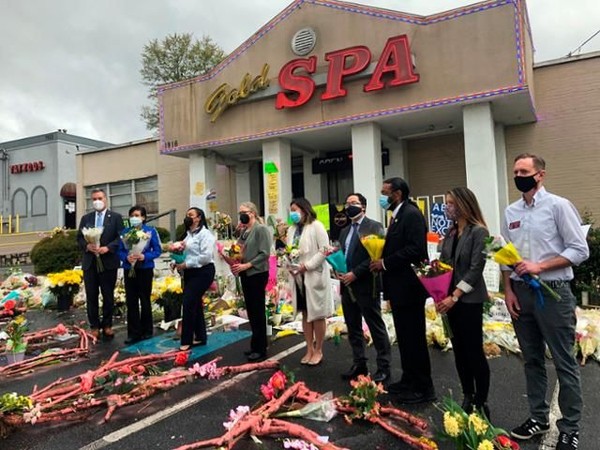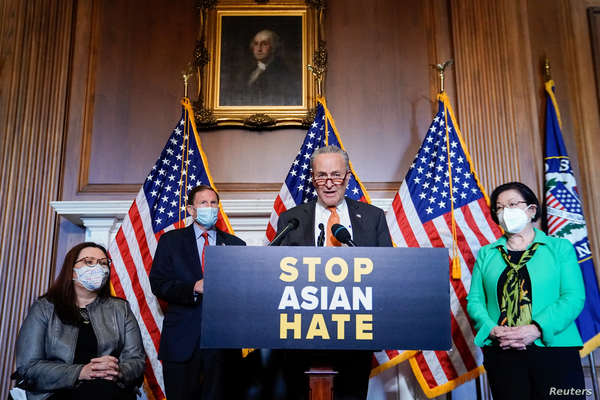
Can you recall the George Floyd case? A black man named George died due to the racist behavior of a police officer. For more details on the case, refer to the FEATURE of The Sookmyung Times No. 361. Just after the public was informed about the incident, people took to the streets to protest against racism, and it seemed that awareness of racism started to improve around the world. However, now acts of racism are towards Asians.

Mourning victims of Atlanta spa shooting

I'm of Asian descent, but I live here
Eight people were killed in shootings at three different spa shops in Atlanta's Cherokee County in the U.S. on March 16. Four of the eight dead were Koreans and the two were of other Asian ethnicities. The shooter was a white male that many experts identified as a racist. However, the police in charge gave a public statement that the motivation for the crime was not hate but sexual addiction, which causes huge controversy in the U.S. The police represented the killing as merely "having a bad day." Citizens then raised suspicions that the police were protecting the criminal. The New York Times also reported on the incident, writing, "Despite the growing fear of Asian Americans of hate crimes triggered by the Atlanta shooting incident, this crime is experiencing difficulty in being classified as a hate crime." Despite the surge in crimes targeting Asians in the U.S. due to COVID-19, it has been almost impossible to prosecute perpetrators for hate crimes. Jun, a Korean who has been living in the eastern part of the U.S. for 10 years, said, "Since the onset of COVID-19 whenever I go to Manhattan, I feel uneasy because of the insecurity."1) Jun's comment indicates that Asians feel an increased sense of being targeted by criminals.
According to the Asia Pacific Policy Planning Committee, an Asian human rights group, 280 cases of hate crimes were received from 47 States from March 2020 to January this year. Of those cases, 420 were filed by Korean victims, which is the second highest after filings by Chinese victims. The civic group STOP AAPI HATE also released related statistics on Asian hate crimes. It announced a total of 503 similar cases between January and February 2021. Together, these numbers indicate that discrimination towards Asians happens at least 10 times every day. 342 of the 503 cases said they had experienced verbal bullying (68%), and 103 said they had been avoided (20.5%). The number of physically attacked persons reached 11%. Statistics clearly show the reality of life facing Asians in the U.S. In particular, the U.S. political media The Hill reported that last year, aversion to Asians increased by 149% in 16 major cities across the U.S. That same year, the seriousness of Asian hate crimes became even more pronounced, given that the total number of hate crimes in the U.S. fell by about 7%. Therefore, there is an urgent need to take measures to protect Asians in the West.

What made them victims?
Discrimination and hatred of Asians existed before the COVID-19 pandemic. The 1992 Los Angeles riot led by Black and Hispanics is one example. At that time, Korean shops were looted intensively in the southern part of Los Angeles and Korea Town, where many Blacks lived. American social critic Mike Davis explained that anger toward white people, dissatisfaction with large corporations, and attitudes that white people were responsible for making them poor among Blacks were expressed to Asians.2) Davis explains the reality facing Asians in U.S. society. According to the U.S. LA police, in 2017, race hate crimes increased by 18.5% compared to 2016, the highest in 15 years. In 2019, a Burger King advertisement depicted an Asian model ridiculously eating hamburgers with chopsticks, and a Dolce & Gabbana advert had a Chinese model eating spaghetti in an odd manner. These two companies' ads sparked the racist debate, long before the cases occurring since the start of the COVID-19 outbreak.
However, China is also partially responsible for the recent crimes against Asians. China has unintentionally spurred on the hate for Asians, once it revealed to the world that COVID-19 originated from China. People started avoiding Chinese people and anyone Oriental because non-Asians have difficulty distinguishing between people from the various Asian nations. During the start of the outbreak, some Asians could be seen wearing T-shirts that said, "I'm not Chinese." Nonetheless, discrimination against them did not always stop. Yun Injin, professor of Sociology at Korea University, said "The idea that Asians may spread such a virus is a direct cause of oriental aversion."3) That is, Asians are branded as virus carriers. What is worse, a local newspaper in France printed an article related to COVID-19 on its front page with the title "Yellow Warning Order." Asians are being attacked even in the media. Foreign media have fueled discrimination and aversion toward Asians.
Moreover, remarks by former U.S. president Trump also contributed to the increase in discrimination against Asians. In a speech at the 75th UN General Assembly on September 23, 2020, he publicly held China responsible, saying, "China blocked movement domestically in the early days of the virus while allowing planes to go out and infect the world." He attacked China and Asians because he was unable to prevent the spread of COVID-19 in the U.S. Trump also implemented immigration restrictions to prevent the spread of the COVID-19. In July of last year, the U.S. Department of Homeland Security and the Ministry of Justice announced new policies for asylum-seekers to prevent the spread of COVID-19. The document clearly stated that immigrants were a serious threat to the U.S. However, Jennifer Minear, president of the American Immigration Lawyers Association, responded to the regulations by saying, "The United States is the country with the highest COVID-19 infection rate. That policy just makes the national rights rise by sacrificing the vulnerable class."4) She criticized the policy saying it did not consider the impact on the vulnerable hierarchy. What was worse, whenever Trump made discriminatory remarks, hate comments against Asians flooded SNS media platforms. In the end, it was the action of former U.S. president Trump that brought about much of the discrimination problems that Asians are currently experiencing.

Senate passed the COVID-19 Hate Crimes Act

What needs to be done
In response to the March 11 Atlanta shooting, U.S. President Joe Biden said, "I am well aware that Asian Americans are very worried. This is wrong, not like the United States. It must be stopped." He indicated that he would address the issue, and in a statement on the 21st of the same month, Biden announced that "Systemic racism and white supremacy are ugly poisons that have long plagued the United States. We will change the law that has made possible continuous discrimination." His statement made it appear that he sympathized with the pain of Asians. Biden also pointed out that Trump's remarks such as "Chinese virus" only reinforce Americans' negative attitudes toward Asia. He vowed to take a different course than the Trump administration. On April 22, U.S. senators passed a bill that would prevent anti-Asian crimes during the COVID-19 period. The bill requires the Department of Justice to promptly examine any hate crime during the COVID-19 pandemic reported to federal, state, and local government judiciary agencies. The bill will be confirmed as law once it is signed by U.S. President Biden.
The South Korean government also has started to take action. It has expressed its deepest condolences to victims of families in the Atlanta shooting and has made it clear that it is willing to support the U.S. government's efforts to combat hatred and violence. However, the Korean government response has been evaluated as inadequate. Professor Park Noja of Korean Studies at the University of Oslo in Norway, said on his Facebook page, "Korea's measures for the pain suffered by Korean compatriots overseas are not enough. It is necessary to strongly promote 'measures for the safety of compatriots'." He criticized the passive attitude of the government. In fact, the effort of the South Korean government has not produced any visible results. In March of last year, Foreign Minister Kang Kyunghwa, during a BBC broadcast, said, "I am aware of the discrimination committed against Asians. Governments have a responsibility to prevent discrimination." However, a year later, the Atlanta shootings occurred, implying that the Korean government has not yet done much to help its citizens overseas.
In the end, citizens came forward to stop racism. After the Atlanta shootings, the movement with the slogan "Stop Asian Hate" started as a way of opposing anti-Asian sentiment throughout the U.S. On March 27, in Los Angeles Korean Town, citizens voluntarily held a "National Action Day". About 2,000 Asian people participated in the rally. They held placards with the slogan "Stop Asian Hate" and handed out T-shirts with the same phrase printed on them. The protestors marched through the center of the Korean Town. Similar rallies were held across the U.S., but on different days in places like San Francisco and Washington. Also, on Instagram, articles with the hashtag "#StopAsianHate", totaled more than 400,000, and on Twitter, the same hashtag was shared about 6.7 million times a day. Many people are voicing agreement on anti-discrimination in Asia. K-pop stars BTS, the fashion brand LMC, and Madonna also joined in the movement and denounced racist acts towards Asians. In other words, for discrimination towards Asians to stop, each government and citizens are making efforts.

What is my COLOR?
If discrimination against Asians continues, international relations will collapse. In particular, hatred of Asians has been directly linked to the deterioration of US-China relations. Despite ongoing efforts by governments to prevent racism, no concrete results have been seen. Therefore, each nation needs to establish clearer measures, designate racist crimes as hate crimes, and announce more appropriate punishments and preventative measures.
1) Kim Seojung, "COVID-19 Please Stop Hating Asian", KBS NEWS, February 26, 2021
2) Lee Taegyu, "3,800 Cases of Asian Hatred in the Year of COVID-19. The United States Has Remained Silent", Hankookilbo, April 5, 2021
3) Park Sungeun, "[News Feature] China or Korea? No Asians!" Head-Raising Racism", YONHAPNEWS AGENCY, February 13, 2020
4) Lee Seol, "Trump Administration, "Immigrants, Serious Threats to the Spread of COVID-19. Asylum Restrictions"", THE DONG-AILBO, July 9, 2020.


